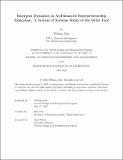| dc.contributor.advisor | Aulet, Bill | |
| dc.contributor.author | Dale, William | |
| dc.date.accessioned | 2025-08-27T14:32:10Z | |
| dc.date.available | 2025-08-27T14:32:10Z | |
| dc.date.issued | 2025-05 | |
| dc.date.submitted | 2025-06-20T18:50:05.742Z | |
| dc.identifier.uri | https://hdl.handle.net/1721.1/162539 | |
| dc.description.abstract | The convergence of artificial intelligence and entrepreneurship education has opened a novel frontier in pedagogical innovation. The deployment of Orbit—a bespoke generative AI tool—within MIT’s 15.390 entrepreneurship course, which follows the structured Disciplined Entrepreneurship framework, is examined through a System-of-Systems perspective. This approach reveals how the tool functions not as an isolated feature but as an integrated element within a multifaceted educational ecosystem. Drawing on quantitative usage data across three consecutive academic semesters (Spring 2024-Spring 2025) complemented by course evaluation metrics, our mixed-methods approach reveals the multidimensional impact of AI-enhanced entrepreneurial education. The findings demonstrate that Orbit, particularly in its refined v2 iteration, functions as a powerful External Enabler that significantly reduces both the opacity and agency-intensity inherent in complex entrepreneurial frameworks. This enabling function manifested through measurable increases in student adoption, idea generation, and iterative engagement with critical DE steps. Beyond efficiency gains, we identify a substantive Transformation of Learning where students developed distinctly different engagement patterns—characterized by increased iteration, greater willingness to tackle complex entrepreneurial challenges, and enhanced overall course experiences. This transformation appears to deepen rather than merely accelerate learning, as evidenced by improved course evaluations alongside increased time investment in coursework. However, our analysis reveals that this transformation operates within the constraints of what we term AI’s "Jagged Frontier"—an uneven landscape of capabilities leading to differentiated impacts across DE tasks and student segments. The evolution from Orbit v1 to v2 underscores how thoughtful system design and curriculum integration critically influence the effectiveness of educational AI tools. This research contributes a nuanced understanding of how specialized AI tools can enhance entrepreneurship education while highlighting that their benefits depend on deliberate design choices, strategic pedagogical integration, and recognition of current technological limitations. The SoS framework proves instrumental in capturing these emergent dynamics, offering valuable insights for educational technologists, entrepreneurship educators, and institutions navigating the AI-enhanced learning landscape. | |
| dc.publisher | Massachusetts Institute of Technology | |
| dc.rights | In Copyright - Educational Use Permitted | |
| dc.rights | Copyright retained by author(s) | |
| dc.rights.uri | https://rightsstatements.org/page/InC-EDU/1.0/ | |
| dc.title | Emergent Dynamics in AI-Enhanced Entrepreneurship
Education: A System of Systems Study of the Orbit Tool | |
| dc.type | Thesis | |
| dc.description.degree | S.M. | |
| dc.contributor.department | System Design and Management Program. | |
| dc.identifier.orcid | https://orcid.org/0009-0000-3641-1248 | |
| mit.thesis.degree | Master | |
| thesis.degree.name | Master of Science in Engineering and Management | |
